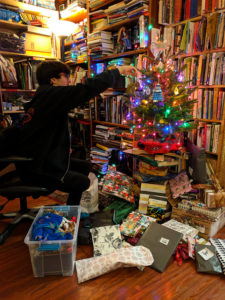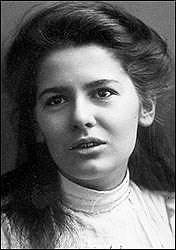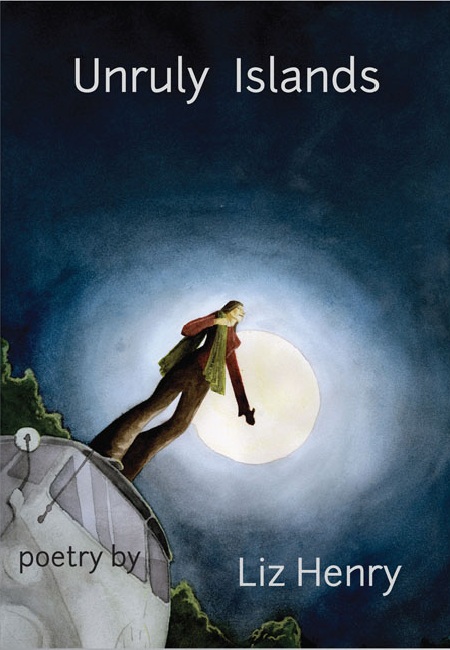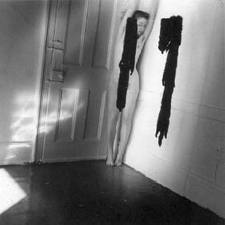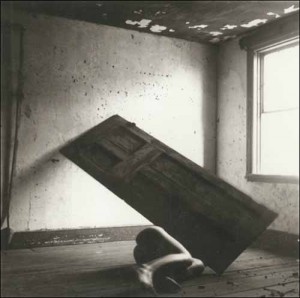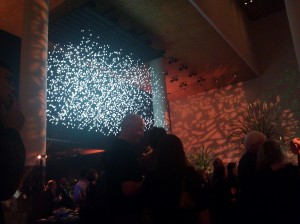Last night I saw the opera Nixon in China and was blown away completely by its complexity and beauty and most especially for how it spoke to me as a feminist. I adore Alice Goodman‘s libretto and like to picture her fervent research and immersion process! I took notes in my lap. Her poetry is fucking awesome. It’s subtle even when she’s basically punching you in the face. Also… in general, the staging from the San Francisco Opera was gorgeous! I could go see it again and be very happy! Read on for a synopsis. Buried somewhere in there will be my reaction to Jiang Qing’s part!
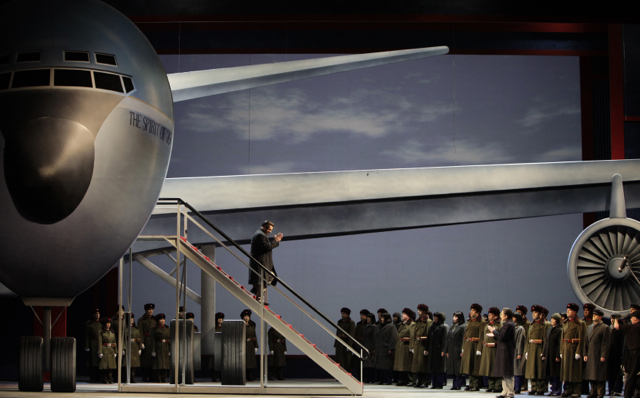
The opera opens with a group of grey-coated cadres waiting for Nixon’s plane to arrive. The plane is projected on screen through mist. As the group sings The Three Main Rules of Discipline and The Eight Points of Attention, gauzy curtains lift and the mist blows away; the people become more clear, strongly declaiming “The people are the heroes now”. It was very moving. A staircase rolls up, Nixon emerges, and there is a scene of rather dull greetings and handshakes prolonged for the crew of a giant old fashioned TV camera which is wheeled around during many scene (and which I loved as a reminder of the events’ conscious political theater). Everyone goes away. Pat Nixon is doing an awesome job of faculty-wifing in her bright red dress. (Her outfits were to die for the whole time…) Did she really wear red? I want to know! It is so significant! Nixon, in “News! News!” imagines his ideal audience, his patriotic vision of small town wholesome America doing stuff while the TV shows his actions on all channels and the blue glow pours out from the curtains to the lawns and streets beyond. He recaps his important handshakes, singing passionately about history and mystery.
News has a kind of mystery;
When I shook hands with Chou En-lai
On this bare field outside Peking
Just now, the whole world was listening.
Then he utterly freaks out, bad-tripping with the brilliant “The rats begin to chew the sheets!” bit where surly, scruffy reporters give him bad press. Oh noes! Nixon! Don’t get all paranoid now! The rats song is extremely catchy.
The scene changes to Mao’s living room where he is attended by a bunch of people, three secretaries who take notes on (& echo) his every word, and Zhou En-Lai. Kissinger and Nixon come in. Nixon totally fails to understand any of the cryptic things Mao says but tries to clumsily work in some references to Chinese culture and history. There is a brief interlude where Pat and Dick are in maybe her dressing room getting ready for the upcoming banquet. She gets in a lot of “yes, dear” but also her theme of “more snow before the spring” begins to develop. Then a fabulous operatic drinking song sequence set at a dull state banquet. There is a good interplay between Nixon and Pat as he sings “I was wrong” and she does a smug little 50’s wifely chortle. I loved the waiters coming in and out (and often stopping to listen to the speeches) and the use of the airplane jetway (modified) for the ridiculously tall podium. The scene and act end with people dancing on the tables. Gambei!! Cheers!!! I love a jolly drinking scene! I wished my son were there to see the choreography of the crowd!
In Act II Pat Nixon gets a lot of further development. She tours Beijing — gets a glass elephant, pets a pig, admires children at play. “It’s Christmas every day!”, she sings, and I thought “A lot of women got ECT trying to achieve your ideal womanhood, and failed”. Pat then happily suggests a picnic in a beautiful park. That last bit was one of my favorite moments of the opera as Pat admires the park (maybe meant to be the Summer Palace?) and the cadres with her fall silent. They react quite badly to her burbling; they describe the oppression that created that beauty. When they see this aesthetic landscape they see graves, starvation, torment. “It’s almost like you knew them” Pat falters. She doesn’t get it. She is sincere but terribly innocent & clueless. She doesn’t understand why they want to dwell on negative things, why they are harsh, upset, angry; why they are so steely. She doesn’t understand why their revolution needs defending, and that they are still in a war and for many good reasons. This scene had me wanting to stand up and cheer.
Pat Nixon sings a long solo aria about how this visit is prophetic. Or maybe it was the snow falling and then clearing. I loved this solo and thought the singer was amazing. A projection of her face was superimposed on a backdrop of waving U.S. flags; I was so grateful to be able to see the details of her perfect acting & emotion. I felt inspired with real respect for the real-world Pat Nixon and her wisdom, insight, delicacy.
Then we cut to a staged performance of Jiang Qing’s version of The Red Detachment of Women. I love that this opera shows her as fierce and uncompromising, shows her attraction rather than simplifying her as a villain. Anyway, we get this completely amazing Hating Tyranny ballet interlude in which a young beautiful peasant girl is being raped and beaten to death by tyrants and foreign oppressors. Very movingly danced. Suddenly Kissinger leaps up from the on-stage audience of diplomats and becomes one of the characters who is raping and whipping the girl (Ching-hua). Now while I am not sure what is going on there I liked that it was blurring the line of art and spectacle with participation in oppression and that the lines of real and play broke down. (Meanwhile I was having other meta-ish thoughts about how many stories I have read in which the real action took place during an opera but in the boxes of the important people… above our heads.) I thought during the first part of the ballet, of the ways in which revolutions including mine want to make art about the experience of oppression from the oppressed’s point of view. And how that is sneered at aesthetically by the dominant culture.
Then, from the stage-audience, Pat Nixon freaks out and tries to save Ching-hua, held back by Nixon. Oh, tender white woman’s tears! Then there was a point where the soldier guy ballet-marches up all sprightly and fresh to save her. I kept thinking, and then fiercely muttering, “Give her the gun. GIVE HER THE GUN. He’s NOT GOING TO GIVE HER THE GUN. Oh my god. FUCK. TAKE THE GUN” knowing that in these things I always mutter that — and she never gets the gun! Instead they dance a romantic little duet which made me want to spit in frustration! Oh! Take the gun, sister! Though I do love the happy-wheelbarrows-rah-rah elements in this bit and others.
Then this, Ching-hua’s song though i think it was sung by a chorus. I scribbled down the bit about the silent gun warms in my hand salving the wound made by man, and looked it up, so here:
It seems so strange
To take revenge
After so long
To find the wrong
Can be undone.
The silent gun
Warms in my hand
Salving the wound
Made by the men
It will gun down
All in good time
I shall kill them
Yes, every one
Revenge is mine.
Yeah!!! You can imagine that gave me shivers.
Now at this point my memory is jumbled as there was a scene of Jiang pressing the gun on Ching-hua (who is hanging out with the new crop of foreign oppressors now) and screaming THAT IS YOUR CUE, looking disappointed Ching-hua does not shoot. She is singing “THAT IS YOUR CUE!” to Ching-hua in frustration. I can’t remember if Jiang or Ching-hua finally shot the cringing rapist foreign oppressor (Kissinger in Mandarin costume). As I looked it up from previous stagings, they seemed quite different from what I remember! I think the San Francisco director did something very interesting! I’d like to see it again or in video. But for me it was amazing either way. Jiang stomping and strutting around so bravely and fiercely! Popping up in her handsome tailored suit like a projection from my own News! News! images of myself that I carry! I raise the weak above the strong! Okay, so, someone shot the rapist and then the Cultural Revolution was ballet danced while Jiang shakes her fist at the world and screams THE BOOK THE BOOK THE BOOK and I thought grim terrible self criticisms of my love of texts and the pitfalls of vengeance and power. (Muttering meanwhile, “Goddammit… fuck this… fuck The Book… Write my own fucking book…. “) Let me be a grain of sand! Every girl is a riot grrrl! Kill rock stars! Either way, it is a criticism of personal vengeance, which is so relevant to criticisms of Jiang… I would also like to say that when Jiang gave her the gun, I noticed a woman in front of me a few rows who had funny colored hair and was with someone my age with dreadlocks, cheered out loud and Danny says I did too. At the opera’s end the singer who played Jiang got a huge cheer from the women in the audience – it was very markedly us cheering her… Which was interesting.
I am the wife of Mao Tse-tung Who raised the weak above the strong When I appear the people hang
Upon my words, and for his sake
Whose wreaths are heavy round my neck
I speak according to the book.
When did the Chinese people last
Expose its daughters? At the breast
Of history I sucked and pissed,
Thoughtless and heartless, red and blind,
I cut my teeth upon the land
And when I walked my feet were bound
On revolution. Let me be
A grain of sand in heaven’s eye
and I shall taste eternal joy.
Food for thought there. I will continue thinking about what Alice Goodman meant in Jiang’s aria. I get that Jiang’s defense of herself at trial was that she was Mao’s dog executing his orders (or his book) But I think Goodman means more in a sort of simulteneity of ways Jiang may have seen herself and her works. As the opera is about a brief event, but stretches backwards and forwards in time and history and the future over an holistic geography; and also how its characters speak about particular things but with the librettist’s knowledge that the audience is listening in a particular way with their own knowledge — I think that much of this is about gender and women as well as Vietnam. That is to say that is what Goodman projects to be in the mind of the audience’s viewing. We don’t have to hear “Vietnam” (though we do, once) to know it is simmering in the audience’s mind as the characters sing about war and peace, as Nixon reminisces about his wartime near-death experiences and ecstasies. Best time of his life, war, but not the best time of the war right then or the war scarred listeners when the opera was written (and not in our minds either today.) Similiarly, Goodman is speaking through Pat Nixon and Jiang to the women in the audience in a way I rarely experience in any performed artwork. It was as if the opera passed the Bechdel test on some meta level. I found that satisfying yet tantalizing. Obviously the Bechdel-test-passing fanfic scene between Pat and Jiang with the secretaries in chorus still needs to be written.
I cannot remember where in the sequence of the opera there was the “burn the books” scene but it was when Nixon says (so awkwardly! so embarrassing!) “Confucius!” and Mao is like “NO!!!” and giant scrolls come down from the ceiling. We get a Koyanisqatsii sort of projectsion of bustling cityscape with neon and traffic projected onto those now-veiled scrolls which become skyscrapers as Mao speaks. I wished he (Mao) could see the present. I have also left out how much I enjoyed Nixon’s singing loudly and jovially about telecommunications satellites! That was beautiful.
About the music, I’m not the world’s biggest music critic, but I like it. A lot of bits remind me of Phillip Glass. Some of the songs are melodic and singable and catchy, while some wander around in the way opera dialogue often does. I had many moments of awe and wonder, thinking not only “this is what poetry is *for*” but also being in awe that what I was hearing was made of human voices. Truly amazing. I love the long contemplative arc of opera and the long thoughts I have during it.
During the third act the two couples reminisce about the trip and their lives in general. Pat gets in a lot more wifely Stepford agreements to Nixon’s rambling about the war with barbed intelligence behind it but some ambiguous bits on how when she read his letters she was doing her hair or cooking some chicken. I interpreted that as part commentary on her bougie-ness but partly her own frustration or criticism of being relegated to that realm of life, the domestic “trivialities” she rejects in Act Two, reading Dick’s letters from the Pacific Theatre. She seems touchingly aware of his PTSD, his being damaged by the war, in a way he isn’t able to know or articulate. Mao and Jiang talk over their lives interspersed with Pat and Dick, with the stage a pastiche of the events and scenes of the opera and their Chinese and U.S. landscapes, memory and present — present as in 1972 but I am pretty sure some of the projected scenes were of times afterward. Mao is tired. Jiang is still jumping around fiercely full of energy and sureness. He thinks the revolution is over and was for boys. (Boys!!) Jiang is like, “No! The revolution will not end!” Or maybe “must not end”. Both the Nixons’ and Mao and JIang’s interchanges are of failed communication. They completely fail to hear each other across gender, just as Mao and Nixon missed communication — and yet in both those situations, something happened and some relationship is possible.
Chou En-lai gets a great pensive monologue at the end. He has been stalking gravely about the stage during all the more florid action of the opera, thoughtful and alert. Now he emerges and steps forward as the future. He is the one who now will frame events. He frets and is a bit neurotic in a good way. How much of what we did was good? (A good companion question to the classic one of “What is to be done?” By having Chou ask this question for this visit as well as for all the events before and after it — we meaning all the characters in the play — Goodman is carefully asserting that SOME of what was done was good, is not buying into a total rejection of either the U.S.’s actions, China’s in general, or the Cultural Revolution. I appreciate that complexity.
